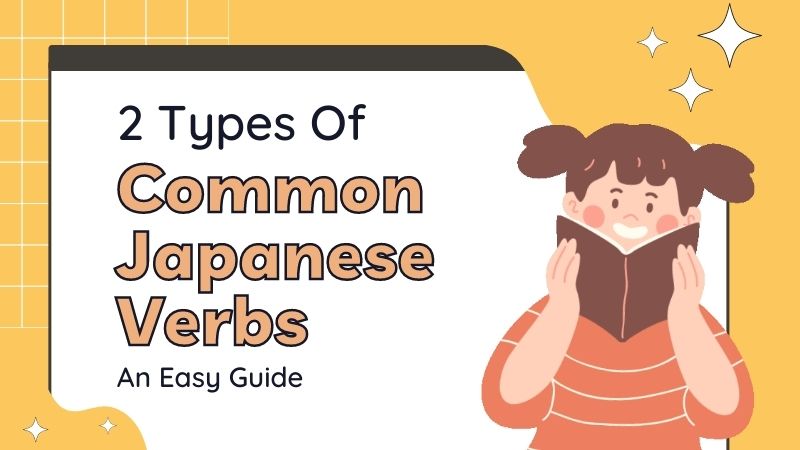Interested in expanding your Japanese vocabulary? This article is the way to go! Filled with various Japanese verbs and how to use them, you can now learn more about the Japanese language and make meaningful connections. In this post, you will learn more about common Japanese verbs, how to use them, their usage, or just the base word of these verbs.
Learning a new language, to some, might be hard. However, it becomes easier with the right amount of hard work and understanding of what you want to learn. The Japanese language is one of the best languages to learn in the world. At first glance, it is complicated. But when you grasp the whole idea of their language, it becomes less complicated than English. What better way to polish or learn your daily dose of Japanese than learning its common verbs, right? Read on to learn more!
A Brief Overview Of Japanese Verbs
If you are a fan of anime or you’re interested in Japan’s culture, then you might not be a stranger to some of these words. However, one misuse of the verb might give people the wrong impression of you. Since people from Japan are very particular with politeness and respect, you should know that even verbs have a degree of respect that is to be attached.
Don’t be intimidated by Japan’s writing system too! With time and work, you won’t think about Japanese being a hard language to learn at all. However, let’s start with these common verbs first and their meanings. It is important to know that their verb structure is very different from the English language. We will start with learning their verb classification and how to make these verbs polite.
Japanese verbs contain a base word and then the right suffix for it. Fun fact, all Japanese verbs end with ‘u’ or ‘ru’. This being said, their verb classification usually falls into these two: the U-verbs and the Ru-verbs.

A List Of U-Verbs You Should Learn
These are the verbs that end with the letter ‘u’. Such verbs are called the Godan verbs. Both U-Verbs and R-Verbs function the same. However, verbs are classified with either two in order to make the sentence easier to understand and provide more context.
Here are some common Japanese U-verbs:
Always remember that a verb’s negative form will always end with the letters “ai”.The verbs above are in their plain form and are subject to change depending on the sentence structure. Do note that these verbs still need to be changed to be polite and respectful.
It is very easy to change these verbs into their polite form. If you’re a beginner in learning Japanese, replacing ‘u’ with ‘i’ and then adding masu ( ます) makes the verb polite. However, if you are trying to make a negative word polite, you will add masen (ません) instead of masu ( ます) but still replace ‘u’ with ‘i’. Easy, right?
Here Are Some Ways How To Use These U-Verbs In Sentences
A List Of Ru-Verbs You Need To Know

These are the verbs that basically end with the letter ‘ru’. Such verbs are called the Ichidan verbs. However, some U-Verbs end in ‘ru’, which is very confusing. To avoid making mistakes in Japanese grammar, keep in mind that if the letter before ‘ru’ is i or e, it is a Ru-Verb.
Check out some examples of the Ru-Verbs:
To make these verbs polite and formal, what you will do is just replace ‘ru’ with masu ( ます) for the positive form and masen (ません) for the negative form. Since Ru-Verbs precede either ‘i’ or ‘e’, you don’t have to change anything besides ‘ru’. Here are some basic Japanese phrases to practice with.
Examples Of Ru-Verbs As Sentences
A List Of Common Japanese Verbs To Expand Your Vocabulary

These are just the common Japanese verbs that you can use to get by when you visit Japan or talk to Japanese people. Japan’s language isn’t just a way of communicating, but it becomes meaningful when you understand it more.
Here are more common Japanese verbs that can help you expand your Japanese vocabulary!
| English | Romaji | Japanese |
| Close | Shimeru | 閉める |
| Push | Osu | 押す |
| Ride | Noru | 乗る |
| Leave | Deru | 出る |
| Enter | Hairu | 入る |
| Take | Toru | 取る |
| Close | Shimeru | 閉める |
| Return | Kaeru | 帰る |
| Serve | Dasu | 出す |
Experience A Good Way Learning Japanese With Ling App
Indeed, learning a new language is never easy, but it’s also not hard if you have the right tools for it. Good thing Ling App has got you covered! It provides a variety of lessons and tips on making your journey in learning a new language easy. Not only is the app very easy to use, but it is also very convenient. The app provides different resources for different languages, not just Japanese. What are you waiting for? Check out the Ling App now!



































































